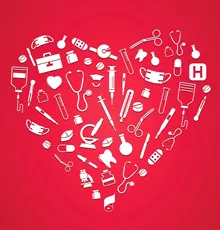Tufts Medical Center’s CardioVascular Center has performed more heart transplants since the year 2000 than any other medical center in New England. In addition, our outcomes are excellent with a one-year patient and graft survival rates of greater than 90%. Although our heart transplant team is proud of this accomplishment, we know that there are many more lives that could be changed by increased knowledge of and participation in organ donation.
The transplant wait list

Right now, there are more than 120,000 people in the United States awaiting a life-saving organ transplant, including over 5,000 in New England alone. And although there are over 120 million registered organ donors in the country, on average twenty-two people will die each day while waiting for the organs they need. The shortage of available donor organs is one of the major limitations preventing these patients from receiving life-saving transplant operations.
For patients at Tufts Medical Center with end-stage heart failure or severe coronary artery disease, a new heart is often the only choice. “These are patients for whom we have exhausted all other treatment options,” says David DeNofrio, MD, Director of Tufts MC’s Heart Failure and Cardiac Transplantation Center. “We are completely dependent on organ donation. Without it, we couldn’t perform these life-saving procedures for people who would otherwise have very limited time.”
It’s not only hearts that benefit patients in need. The kidneys, liver, lungs, pancreas and intestines can all contribute to the miracle of transplantation: just one organ donor can save up to eight lives. Even tissue—skin, blood vessels, heart valves, tendons, ligaments and bone—can be used in a range of surgical procedures to improve the lives of people affected by injury, illness or a congenital defect. Organ donation is critical to many of medicine’s modern marvels.
The importance of registering as an organ donor
The vast majority of transplant organs come from deceased donors. While death is a somber event for friends and loved ones, organ donation offers at least one opportunity for a silver lining. By deciding ahead of time to donate your organs after death, you save those around you from having to make this difficult decision, and save valuable time during which patients’ lives can be transformed.
Many people are hesitant to register as organ donors, for reasons such as religious and cultural beliefs, family members’ wishes, a desire to keep the body intact after death and general lack of knowledge about the organ donation process. A particular worry is that organs will be taken prematurely—that doctors will not go to the same lengths to save an organ donor as they would to save a non-donor patient.
According to Dr. DeNofrio, this fear is a myth that stands at odds with the ethical oaths taken by physicians. “Doctors make every effort to save each and every one of their patients. It’s part of the mindset that drives them to practice medicine. The only difference with organ donors is that their deaths have the ability to contribute new life.” Donation is never pursued unless all life-saving measures have failed and death has been declared in accordance with the Uniform Determination of Death Act (1980).
Private beliefs must be honored and protected, but people should be fully educated about both the need for donor organs and the ease of the registration process. Every person who chooses to become an organ donor increases the chances that a person on the waiting list will receive a life-saving transplant. And registration is mere clicks away, through either your state’s department of motor vehicles or the National Donate Life Registry.
How to register as an organ donor in New England
Donors living in Massachusetts and Maine possessing a valid driver’s license may choose to register through their state’s online service: Massachusetts Registry of Motor Vehicles: Organ & Tissue Donor Enrollment, Maine Bureau of Motor Vehicles: Organ Donor Registry. If you are living in Connecticut, New Hampshire, Rhode Island or Vermont, you may either visit Donate Life New England (a division of the National Donate Life Registry) or indicate your choice the next time you update your driver’s license.
For more information on donation, visit New England Organ Bank, United Network for Organ Sharing or the U.S. government organ and tissue donation awareness web site, Organdonor.gov. If you feel comfortable and informed enough to register, or if you are registered already, please encourage family members to do the same. Organ donation has the power to change lives in a way unlike any other. It is perhaps the most altruistic act we can perform, the greatest gift we can give—life.
Sources:
“Organ Donation.” New England Organ Bank, https://neds.org/. Accessed 19 August 2016.
“The Need Is Real: Data.” U.S. Government Information on Organ and Tissue Donation and Transplantation, https://www.organdonor.gov/learn/organ-donation-statistics. Accessed 23 August 2016.
“Organ Procurement and Transplantation Network.” Health Resources and Services Administration, https://optn.transplant.hrsa.gov/. Accessed 23 August 2016.
Irving, M.J., Tong, A., Jan, S., Cass, A., Rose, J., Chadban, S., . . . Howard, K. (2011). Factors that influence the decision to be an organ donor: a systematic review of the qualitative literature. Nephrology Dialysis Transplantation, 0, 1-8.

